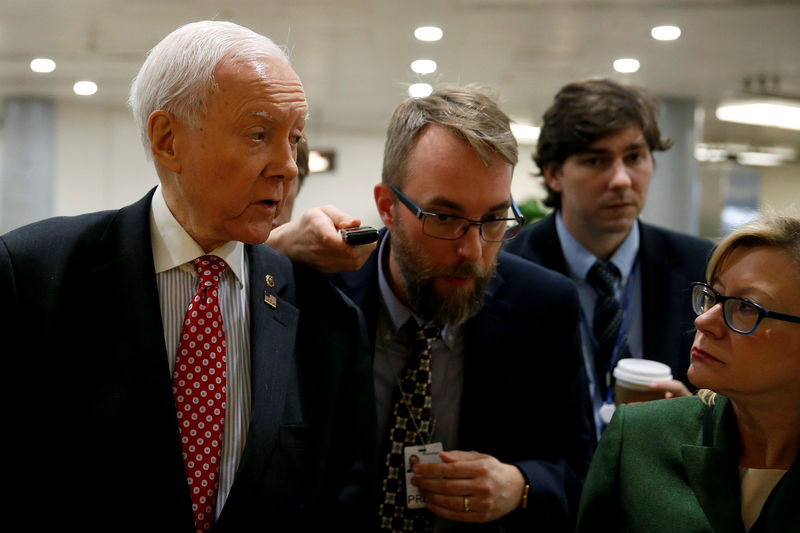By Susan Cornwell and Amanda Becker
WASHINGTON (Reuters) - A U.S. Senate tax-cut bill, differing from one in the House of Representatives, was expected to be unveiled on Thursday, complicating a Republican tax overhaul push and increasing skepticism on Wall Street about the effort.
As the House tax committee worked on its bill, members of the Senate weighed new approaches to corporate taxes, deductions for state and local taxes and the estate tax on inherited assets, senators said, providing few details.
John Cornyn, the No. 2 Senate Republican, told reporters that senators would be briefed on the bill on Thursday before its release.
House and Senate Republicans are working on separate plans for the biggest overhaul of the U.S. tax code since the 1980s. President Donald Trump and his House allies have proposed slashing the corporate tax rate to 20 percent from 35 percent, one of the costliest features of the wide-ranging House plan.
The tax overhaul is a priority for Trump, who says it will boost economic growth and create jobs. Republicans have yet to score a major legislative win since he took office in January, although they control Congress as well as the White House.
Democrats have blasted the proposals in the Republican tax legislation as giveaways to large corporations and the rich.
Senator Orrin Hatch, chairman of the tax-writing finance committee, told reporters he would prefer not to delay a corporate tax cut by a year, which some lawmakers said was a possibility. "I’d prefer to get it done," he said.
Financial markets have rallied since Trump's stunning election victory in November 2016, partly on expectations that he and Congress would slash taxes on businesses.
Stock markets closed little changed on Wednesday, with investors focused on chances for a tax bill becoming law.
"I do think there's disappointment with Republicans kicking the tax bill around. ... Some of the things leaking out are not encouraging," said Bucky Hellwig, senior vice president at BB&T (NYSE:BBT) Wealth Management in Birmingham, Alabama.
WARNING TO REPUBLICANS
The latest version of the House bill would add $1.7 trillion to the federal deficit over 10 years, said the nonpartisan Congressional Budget Office, which tallies the costs of legislation.
That would violate a rule requiring the legislation to add no more than $1.5 trillion to the deficit. But Representative Kevin Brady, Republican chairman of the House tax committee, said he would revise the legislation on Thursday to bring it into compliance.
A report from the nonpartisan Tax Policy Center think tank said the biggest tax cuts would go to high-income households under the current bill, which would raise taxes on more than one in four taxpayers by 2027 because of the expiration of certain benefits including a $300 family credit,
Top earners with incomes of more than $730,000 would get 21 percent of the benefits in 2018 and nearly 50 percent in a decade, the report said.
The House bill would repeal a tax deduction Americans can now take for state and local income and sales taxes, but preserve it for business owners. It would cap the deduction for state and local property tax paid at $10,000.
Republican Senator David Perdue told reporters the Senate bill could repeal the entire state and local tax (SALT) deduction, a concern for people in heavily Democratic high-tax states such as California, New York and New Jersey.
Senate Democratic leader Chuck Schumer of New York said victories for Democrats in state elections on Tuesday should be a warning to Republicans. "The Republicans should look at the elections last night, and it should be a giant stop sign for their tax bill," Schumer said.
There are enough Republicans from high-tax states in the House to torpedo the tax bill, given that Democrats broadly oppose it. Republicans, who have a slim 52-48 majority in the Senate, also may need support from Democrats to pass their version. The House and Senate must agree on a single version before it can be sent to the president.
ESTATE TAX
Republican Senator Susan Collins, whose vote is crucial, declined to say if the Senate bill would duplicate the House's proposed estate tax repeal. But she told reporters: "It’s certainly true that I expressed reservations about having complete repeal."
A Washington tax expert raised concern about a House provision to create a 25 percent tax rate for "pass-through" businesses, saying it would do little to help small business and be vulnerable to abuse.
Pass-through businesses, which include mom-and-pop enterprises and large private companies, are not organized as publicly traded corporations. Profits are passed through to their owners as individual income and taxed at rates as high as 39.6 percent.
Steven Rosenthal, a senior fellow at the Tax Policy Center, said the new pass-through rate "would add great complexity" and "provide plenty of opportunity for clever investors and business owners ... to game the system."
In addition, a proposed 20 percent excise tax meant to discourage foreign companies from shifting U.S. profits offshore "appears dead," said Chris Krueger, an analyst at financial firm Cowen's Washington Research Group.
The tax was amended by the House committee after complaints from multinational companies.

"Now, the one real safeguard in the plan ... is all but gone," said Clark Gascoigne, deputy director of the FACT Coalition, a liberal tax activist group in Washington.